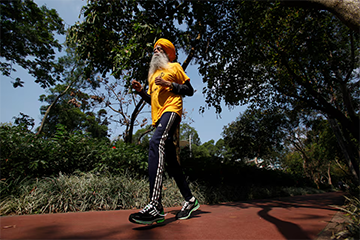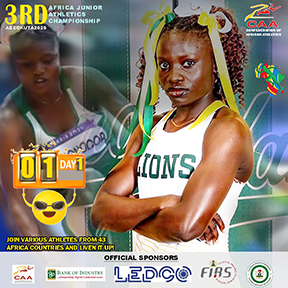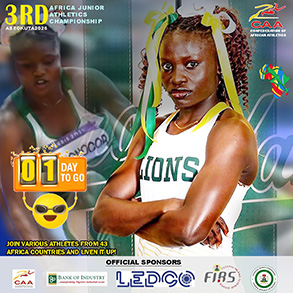Athletics
WHY THE NATIONAL SPORTS FESTIVAL MUST BE PUT ON HOLD

BY SMARTS EBHODAGHE
It is no longer news that the 20th National Sports Festival tagged Edo 2020 was postponed just a few days to the commencement due to the outbreak of the Covid-19 pandemic. The postponement was in line with the efforts of the government to check the spread of the virus that is still ravaging parts of the world in alarming proportions.
Though the number of daily infections seems to be on the downward trend in Nigeria, the relevant health authorities have continued to advise that precautions have to be taken to avoid a second wave of infections. This is the reason full-scale sporting activists have not resumed across country.
Having removed the lid a few weeks ago for contact sports to resume in Nigeria, the national sports governing body is now considering the idea of staging the postponed sports festival anytime soon. However, my concern with the laudable idea is the speed with which it wants it done as if the end is here.
More disturbing is the suggestion that the games would be staggered over weeks, into months, without the usual spectatorship. What this will imply is that the authorities just want to fulfill all righteousness that the games held, whether there were gains or not.
Naturally, the national sports festival is about the people – athletes, officials, spectators, the micro/medium business community and the government. As the name implies, it is a festival that is celebrated to have various positive impacts on the people.
The urgent desire to just have it done for the fun of it is not in the best interest of the people, and especially the host state that has sunk billions of taxpayers’ money into preparations for the games.
The intension and belief of doing so was, and still, that hosting the festival will bring about improvement in the socio-economic fortunes of the people of the state.
Before the postponement of the games was announced, vendors of diverse wares had paid for spaces within the games venues to display and market their products and services to the teeming spectators expected atthe games. What then becomes of such vendors when the games are staggered and no spectators allowed into the venues?
On the parts of the athletes who have not been training since the postponement of the games due to the lockdown that followed, how well will they compete with the short notice to come for the games?
Are they mentally, psychologically and physically prepared for the games in the immediate?
This is not the first time the National Sports Festival would be postponed in its history, especially as this latest postponement is on force majeure.
After the 18th edition hosted by Lagos State in 2012, the festival suffered multiple postponements until it eventually held in 2018 with its accompanying fanfare.
If the biggest global sporting gathering, the Olympics, earlier billed for 2020 in Tokyo, Japan could be postponed till 2021 on the account of the same Covid-19 pandemic, why the rush by Nigeria to host its national games?
The postponement is in the best interest of everyone that has one thing or the other to do with the games actively or passively.
The Edo 2020 festival can hold in the first quarter of 2021, giving the Local Organising Committee and the various sub-committees adequate opportunity to put post Covid-19 measures in place to make the games even more exciting to behold. It will also allow room to focus on the tiny details that still needed some attention even at the time of the postponement.
As it is said, anything worth doing at all is worth doing well. Let’s use this opportunity to showcase Nigeria as a country that does things properly and professionally, instead of the other way round.
Athletics
Oldest marathon runner Fauja Singh dies at 114 in hit-and-run episode

Fauja Singh, regarded as the oldest person and the first centenarian to complete a full marathon, has died at the age of 114 after he was struck by a vehicle near his village in Punjab, India, media reports said.
Singh, who claimed to be born in 1911, completed the Toronto Waterfront Marathon in 2011, when he was 100. He had registered his best time in a full marathon at the same event in 2003, finishing the race in five hours and 40 minutes.
He was not inducted into the Guinness Book of World Records due to the lack of a birth certificate, as birth records were not kept in India in 1911, media reports said in 2011.
“My ‘Turbaned Tornado’ is no more,” Singh’s biographer Khushwant Singh posted on X on Monday.
“He was struck by an unidentified vehicle around 3:30 PM today in his village, Bias, while crossing the road. Rest in peace, my dear Fauja.”
Efforts were underway to identify the vehicle, which fled the scene, police told local media.
An amateur runner in his youth, Singh later settled in London, where he began running competitively at 89. He ran several full marathons and also competed in 10 km races before retiring in 2013.
“He was an exceptional athlete with incredible determination. Pained by his passing away. My thoughts are with his family and countless admirers around the world,” India’s prime minister Narendra Modi posted on X on Tuesday.
-Reuters
Join the Sports Village Square channel on WhatsApp: https://whatsapp.com/channel/0029Vaz7mEIGk1FxU8YIXb0H
Athletics
African Youth Athletics Championships Begin in Abeokuta with Packed Schedule of Track and Field Action

BY KUNLE SOLAJA.
The city of Abeokuta, capital of Ogun State in southwestern Nigeria, has come alive as it plays host to the African U18 and U20 Athletics Championships, which officially kicked off on Wednesday, July 16.
With hundreds of young athletes from across the continent competing, the five-day championship promises to be a showcase of Africa’s rising stars in track and field.
The opening day featured a flurry of events, including finals in the U18 men’s high jump and U18 women’s triple jump, alongside heats in the 100 metres across U18 and U20 male and female categories.
The evening concluded with the U20 women’s 3000 metres and the U20 men’s 10,000 metres finals.
Day Two (July 17) began with early morning action in the men’s U20 decathlon and sprint hurdles. The session also included the 100m semifinals in all four major divisions—U18 and U20, male and female.
In the afternoon, fans witnessed finals in the U18 women’s discus, U20 men’s shot put, and U20 women’s 1500m, as well as high jump, triple jump, steeplechase, and the highly anticipated 100m finals. The U20 mixed 4x400m relay closed out the day with excitement.
Day Three (July 18) featured more medal opportunities, with the U18 men’s hammer throw and 400m finals for both U18 boys and girls during the morning session. Decathlon and heptathlon events also progressed steadily.
The afternoon session included U18 women’s long jump, triple jump, 100m hurdles finals, and 200m sprint semifinals.
Day Four (July 19) saw the endurance athletes take the spotlight with the 10,000m race walk finals for both U18 and U20 men in the morning.
In the afternoon, there were finals in the 400m hurdles, steeplechase, shot put, pole vault, and 200m sprints.
The evening wrapped up with thrilling relays, including the medley and 4x100m finals for U20 men and women.
Final Day (July 20) is set to deliver a fitting climax to the championships. Morning events include the 10,000m and 5,000m walks for U20 and U18 women, as well as key heptathlon and octathlon events.
The evening will bring finals in the 200m, 800m, long jump, javelin, discus, hammer throw, and the 4x400m relays for both men and women.
With more than 100 events scheduled, the African U18 and U20 Championships in Abeokuta provide a vital platform for emerging athletes to shine on the continental stage.
The competition also serves as a stepping stone toward future global championships, including the World Juniors and the Olympic Games.
Organizers have indicated that the event timetable may be adjusted depending on the number of participants and prevailing local conditions.
Nonetheless, Abeokuta is set to witness a festival of speed, strength, and stamina as Africa’s future athletics stars battle for continental glory.
Join the Sports Village Square channel on WhatsApp: https://whatsapp.com/channel/0029Vaz7mEIGk1FxU8YIXb0H
Athletics
Excitement Builds in Abeokuta as 35 Nations Arrive for African U18/U20 Athletics Championship

ABEOKUTA, NIGERIA – Final preparations are in full swing. Abeokuta will host the 3rd edition of the Confederation of African Athletics U18/U20 African Athletics Championship.
This event is scheduled to run from July 16 to 20, 2025, at the MKO Abiola Arena
With just one day to go before the opening events, the Algerian and Moroccan contingents arrived on Monday night. This brought the total number of participating countries to 35. This confirms a strong continental turnout for the youth athletics showcase.
Track and field powerhouses such as Kenya, South Africa, Ethiopia, Uganda, Ghana, and Egypt are already on ground. This sets the stage for a thrilling contest of emerging talents across various disciplines.
Nigeria, playing host, has rolled out comprehensive logistical plans. These plans ensure a smooth experience for athletes, officials, and fans. Security, transportation, accommodation, and protocol arrangements are fully activated. Officials are working round the clock to deliver a world-class event.
The city of Abeokuta is already alive with colour and culture. Traditional dancers and cultural troupes have been entertaining visitors with vibrant displays of Nigeria’s rich heritage. Members of the visiting delegations, including North African athletes, have enthusiastically joined in the festivities, adding to the celebratory mood.
Meanwhile, the administrative side of the championship is also underway. The CAA held its congress at the Confluence Hotel, Abeokuta, where member federations and athletics officials gathered to deliberate on the future of African athletics.
Presided over by CAA President Hamad Kalkaba Malboum, the congress focused on crucial reforms, sustainability measures, and strategic plans aimed at enhancing the global competitiveness of African athletes. The session reaffirmed the championship’s dual role as a platform for both elite competition and long-term development of the sport on the continent.
With the countdown nearing zero, all eyes are now on Abeokuta as Africa’s next generation of track and field stars prepare to take centre stage.
Join the Sports Village Square channel on WhatsApp: https://whatsapp.com/channel/0029Vaz7mEIGk1FxU8YIXb0H
-

 World Cup2 days ago
World Cup2 days agoFIFA May Shift 2026 World Cup Matches from U.S. to Canada Over Visa and Human Rights Concerns
-

 OBITUARY2 days ago
OBITUARY2 days agoBREAKING! Former Super Eagles Coach and Ex-International Monday Sinclair Passes On
-

 OBITUARY5 days ago
OBITUARY5 days agoBREAKING: Former Nigerian President Muhammadu Buhari Dies at 81
-

 WAFCON1 week ago
WAFCON1 week agoTensions Flare as Algeria Politicizes 2025 Women’s AFCON in Morocco
-

 La Liga1 week ago
La Liga1 week agoFormer Real Madrid manager and Brazil Coach, Carlo Ancelotti sentenced to prison
-

 Nigerian Football3 days ago
Nigerian Football3 days agoLegacy Renewed: Taiwo Lekan-Salami Charts Bold Path for Shooting Stars Revival
-

 Nigerian Football6 days ago
Nigerian Football6 days agoEx-NFF President Maigari Pays Solidarity Visit to Recuperating Ibrahim Galadima in Kano
-

 WAFCON1 week ago
WAFCON1 week agoGhana’s hopes hang in the Balance after a 1-1 draw with Mali




